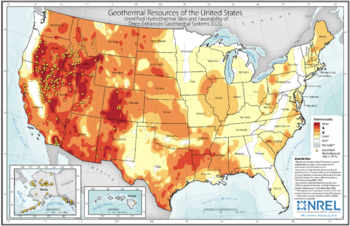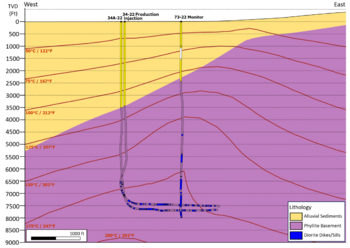Geothermal energy: Difference between revisions
Jump to navigation
Jump to search

(Make Fig.2 caption more explanatory.) |
m (change "fracked" to "fractured") |
||
| Line 2: | Line 2: | ||
{{Image|Geothermal Resources USA.png|right|350px|Fig.1 Geothermal resource favorability and identified hydrothermal sites}} | {{Image|Geothermal Resources USA.png|right|350px|Fig.1 Geothermal resource favorability and identified hydrothermal sites}} | ||
{{Image|GeoThermal Well.png|right|350px|Fig.2 A cross-section of the Fervo Enhanced Geothermal System. Horizontal drilling and fracking allows for larger extraction of energy from a hot zone near the surface. Water flows from an injection well through the | {{Image|GeoThermal Well.png|right|350px|Fig.2 A cross-section of the Fervo Enhanced Geothermal System. Horizontal drilling and hydraulic fracking allows for larger extraction of energy from a hot zone near the surface. Water flows from an injection well through the fractured rock to a production well running parallel.}} | ||
'''Geothermal energy''' is [[energy]] extracted from the [[heat]] stored beneath the [[Earth]]'s surface by means of water (or steam) circulating in deep wells. The threat of global warming from CO2 emissions has stimulated great interest in generating electricity from this clean, steady, and unlimited source of heat energy. The heat can also be used directly to replace fossil fuels in heating homes and buildings. Nations like Iceland, with favorable geology have made geothermal energy their primary source of heat and electricity. The problem for other areas of the world is that the heat is buried too deep. Recent progress in drilling technology has revived hope that geothermal energy may become a big part of our energy solution. | '''Geothermal energy''' is [[energy]] extracted from the [[heat]] stored beneath the [[Earth]]'s surface by means of water (or steam) circulating in deep wells. The threat of global warming from CO2 emissions has stimulated great interest in generating electricity from this clean, steady, and unlimited source of heat energy. The heat can also be used directly to replace fossil fuels in heating homes and buildings. Nations like Iceland, with favorable geology have made geothermal energy their primary source of heat and electricity. The problem for other areas of the world is that the heat is buried too deep. Recent progress in drilling technology has revived hope that geothermal energy may become a big part of our energy solution. | ||
Revision as of 17:40, 29 September 2023
Geothermal energy is energy extracted from the heat stored beneath the Earth's surface by means of water (or steam) circulating in deep wells. The threat of global warming from CO2 emissions has stimulated great interest in generating electricity from this clean, steady, and unlimited source of heat energy. The heat can also be used directly to replace fossil fuels in heating homes and buildings. Nations like Iceland, with favorable geology have made geothermal energy their primary source of heat and electricity. The problem for other areas of the world is that the heat is buried too deep. Recent progress in drilling technology has revived hope that geothermal energy may become a big part of our energy solution.
Reading List
- Geothermal Energy: How Big is the Potential? Sabine Hossenfelder, 2023. Dr. Hossenfelder's skeptical review of geothermal well failures.
- Enhanced Geothermal Shot Analysis for the Geothermal Technologies Office (NREL 2023) Chad Augustine, et.al. National Renewable Energy Laboratory Technical Report NREL/TP-5700-84822.
- Fervo Energy website - recommended by WJ Koch in RvN Debate 9/10/23
- Fervo Energy | Future of Technology Talk A presentation by Tim Latimer, CEO of Fervo Energy, Oct 11, 2022.
- Eavor Technologies | The First Scalable Form of Clean Baseload Power video from Disruptive Investing, 2022.
- Commercial-Scale Demonstration of a First-of-a-Kind Enhanced Geothermal System Jack H. Norbeck and Timothy M. Latimer, White Paper, Fervo Energy, 2023. See Figure 2. This is a test well intended to demonstrate the economic feasibility of generating power using the latest drilling and fracking technology. Can it provide energy cheaper than coal? That is the question they must answer.
- 2022 GETEM Geothermal Drilling Cost Curve Update, Robins, Jody C., Devon Kesseli, Erik Witter, and Greg Rhodes. 2022. National Renewable Energy Laboratory. NREL/CP-5700-82771.

